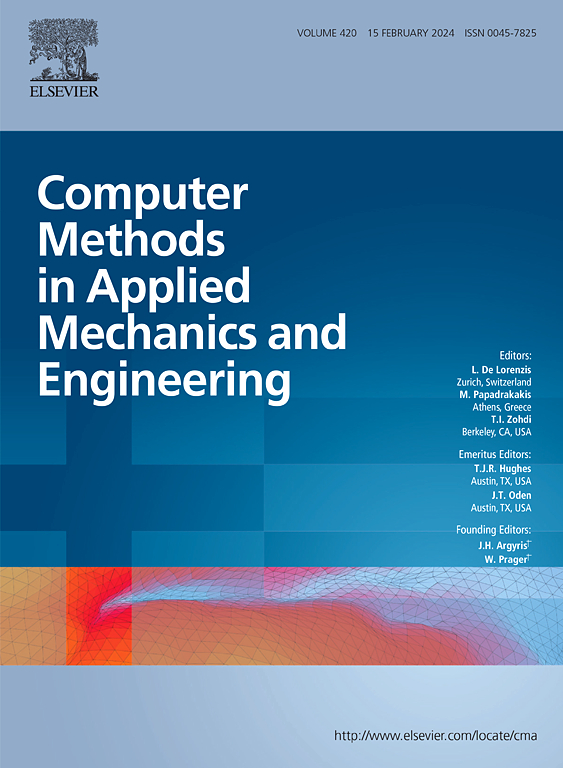Parallel constrained Bayesian optimization via batched Thompson sampling with enhanced active learning process for reliability-based design optimization
IF 7.3
1区 工程技术
Q1 ENGINEERING, MULTIDISCIPLINARY
Computer Methods in Applied Mechanics and Engineering
Pub Date : 2025-05-22
DOI:10.1016/j.cma.2025.118066
引用次数: 0
Abstract
This paper proposes an effective and robust decoupled approach for addressing reliability-based design optimization (RBDO) problems. The method iteratively performs a parallel constrained Bayesian optimization (PCBO) with deterministic parameters based on the most probable point (MPP) underpinning limit-state functions (LSFs) sequentially updated through an enhanced active learning-based reliability evaluation process. During the deterministic optimization process, the PCBO integrates with a trust region approach that considers a collection of simultaneous local optimization runs, each guided by an independent Gaussian process (GP) model. The trust region approach leverages a well-established selection strategy in reinforcement learning, known as the multi-armed bandit, to allocate samples across local trust regions and decide which local optimization runs to continue. In particular, batched Thompson sampling is adopted as an acquisition function to determine the optimal design by selecting a batch of candidate points from local trust regions via sampling from the posterior of the independent GP models, with the batch evaluations executed in parallel. In the reliability analysis, the GP model estimates, from the optimal design offered by the PCBO, the spectrum of LSFs under random parameters, and hence allows an efficient failure probability estimation through a cross-entropy (CE) method with Gaussian mixture (GM) clustering without direct performance function evaluations. By leveraging information from the GM clustering, an enhanced active learning mechanism is developed to strategically refine the GP model by generating multiple informative points in the clustered regions with the largest uncertainty and high-reliability sensitivity, thus improving the accuracy of failure probability predictions. Eventually, an invertible cross-entropy (iCE) method is proposed to decouple the reliability analysis from the optimization process, enabling the update of the new MPP assigned for the PCBO to identify the new optimal design. The proposed method significantly alleviates computational costs for both deterministic design optimization and reliability analysis and quickly converges to the optimal RBDO design. Three numerical examples are provided to illustrate the efficiency and robustness of the proposed approach in addressing the RBDO problem.
基于批量汤普森采样的并行约束贝叶斯优化与增强主动学习过程的可靠性设计优化
针对基于可靠性的设计优化(RBDO)问题,提出了一种有效的鲁棒解耦方法。该方法通过改进的基于主动学习的可靠性评估过程,基于最可能点(MPP)支持极限状态函数(lfs)的顺序更新,迭代地进行具有确定性参数的并行约束贝叶斯优化(PCBO)。在确定性优化过程中,PCBO集成了一种信任域方法,该方法考虑了一系列同时进行的局部优化运行,每个优化运行都由一个独立的高斯过程(GP)模型指导。信任域方法利用强化学习中一种完善的选择策略,即多臂强盗,在局部信任区域分配样本,并决定继续运行哪些局部优化。其中,采用批量汤普森采样作为获取函数,通过对独立GP模型的后验抽样,从局部信任区域中选择一批候选点,并并行进行批量评估,从而确定最优设计。在可靠性分析中,GP模型根据PCBO提供的最优设计估计随机参数下lsf的谱,因此可以通过交叉熵(CE)方法和高斯混合(GM)聚类方法进行有效的故障概率估计,而无需直接评估性能函数。利用GM聚类的信息,建立了一种增强的主动学习机制,通过在最大不确定性和高可靠性灵敏度的聚类区域生成多个信息点,对GP模型进行战略性改进,从而提高故障概率预测的准确性。最后,提出了一种可逆交叉熵(iCE)方法,将可靠性分析与优化过程解耦,使分配给PCBO的新MPP能够更新以识别新的最优设计。该方法显著降低了确定性设计优化和可靠性分析的计算成本,并能快速收敛到最优RBDO设计。给出了三个数值算例,说明了该方法在解决RBDO问题时的有效性和鲁棒性。
本文章由计算机程序翻译,如有差异,请以英文原文为准。
求助全文
约1分钟内获得全文
求助全文
来源期刊
CiteScore
12.70
自引率
15.30%
发文量
719
审稿时长
44 days
期刊介绍:
Computer Methods in Applied Mechanics and Engineering stands as a cornerstone in the realm of computational science and engineering. With a history spanning over five decades, the journal has been a key platform for disseminating papers on advanced mathematical modeling and numerical solutions. Interdisciplinary in nature, these contributions encompass mechanics, mathematics, computer science, and various scientific disciplines. The journal welcomes a broad range of computational methods addressing the simulation, analysis, and design of complex physical problems, making it a vital resource for researchers in the field.

 求助内容:
求助内容: 应助结果提醒方式:
应助结果提醒方式:


